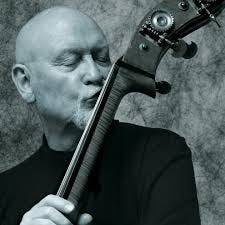Without Prejudice: A Journey Into the Musical World of Danny Thompson
A high-speed tour of six decades of refreshingly doctrine-free music making....
Sometime in July, when Universal releases the long-awaited Nick Drake archival document The Making of Five Leaves Left, the bassist Danny Thompson will again find himself besieged with media requests. He’s used to it: Ever since the 1969 release of Drake’s austere chamber-folk debut, Thompson has been grilled about the sessions. Hundreds of times.
It's understandable: That record has been known to burrow deep into the hearts and minds of listeners, taking up permanent residence.
“People talk about Nick Drake and Pentangle, and fair enough,” the 86-year-old Thompson says, calmly but firmly, in a clip from a documentary-in-progress about him. But, he continues, “in between them, I played with Little Walter, and Josh White, Sonny Terry, Brownie McGee, the Five Blind Boys of Alabama….at Ronnie Scott’s [the legendary London club] I did a month with Joe Williams.”
In other words: When Danny Thompson showed up, at producer Joe Boyd’s behest, to add acoustic bass to Drake’s guitar tracks for Five Leaves Left, he brought with him a musical sensitivity that was not informed by a single type of music. His ideas about groove came in part from English folk music, but grew further during the four years he played in Alexis Korner's Blues Incorporated, and further through an association with guitarist John McLaughlin, and further still during the early days of Pentangle, the folk-jazz band he co-founded in 1967.
Thompson was ready for Drake’s contrasts between placidity and tension, his explorations of modality, the Coltrane-like incantations of his melodies.
As Thompson told the UK magazine Louder in 2024: “Back in the 60s I used to get a lot of grief from jazzers, asking me why I was bothering to play all that folk stuff. But I was never bothered what type of music it was. It was music, you know? Plain and simple.” In the documentary trailer, he expresses this even more succinctly: “My whole life in music has been without prejudice.”
The Thompson discography backs this up. It traces an incredible, unlikely, never-to-be-repeated trajectory through six decades of music. A few salient stops: The bassist backed folk legend Tim Buckley in 1968 on a UK tour that yeilded the live Dream Letter; the same year, Thompson recorded with UK pop star Cliff Richard (Congratulations) and with the psychedelic songwriter Donovan (Barabajagal ). Thompson contributed to Rod Stewart’s solo breakthrough Every Picture Tells a Story (arguably the last significant work from Rod the Mod) and the Five Blind Boys of Alabama’s “comeback” album Spirit of the Century.
The bassist recorded several times with guitarist and songwriter Richard Thompson (no relation), helped John Martyn conjure the fervent, intense, post-folk landscapes of Solid Air (1973) and subsequent works, and was foundational to the first solo album by David Sylvain, Brilliant Trees (1984). That’s not all: Thompson’s discography includes work with T. Rex (Light of Love, 1974), Peter Gabriel (Up, 2002) as well as low-end support on several Kate Bush albums (including The Dreaming from 1982).
Those paying attention to the creative expansions of folk that erupted in London in the late ‘60s regard Thompson among the pioneers of the imaginative scene that gave us not only Pentangle but Fairport Convention and its many offshoots and solo projects. His broad, encompassing tone brought a sense of movement, an almost balletic animation, to intricate Pentangle tracks like “Light Flight,” from Basket of Light (1969):
And here’s a taste of Thompson’s blues conception, from the oddly and unfortunately treble-heavy reissue of Korner’s 1966 Sky High:
If forced to select one title that epitomizes Thompson’s belief in musical commonality and openness, my choice would be the sparkling cross-cultural collaborations between the bassist, members of the flamenco group Ketama and the famously fleet-fingered Malian kora master Toumani Diabate. Songhai (1988) – and to a slightly lesser extent Songhai 2 (1994) – defy all attempts at genre classification. They’re chronicles of alert, rapidly shifting spontaneous exchange that underscore how music can, seemingly without effort, transcend considerations of geography, style, ideology.
This could stretch to marathon lengths and still not fully encapsulate Thompson’s contribution. Still, the bassist’s consistently surprising sideman work is only part of the story. There’s also this, the intimate, entrancingly textured first record Thompson put out under his own name: The magical Whatever (1986).
We don’t encounter records like this too much anymore. The music, all of it written by Thompson, incorporates his brawny bass, acoustic and electric guitars (by Bernie Holland), and flutes, saxophones and Northumbrian pipes (from Tony Roberts), into a series of vivid, carefully scored fantasias. Tracks like the above “Yucateca” suggest a chamber music without borders, a disarming yet thoroughly cohesive mashup of Andalusian cadences, Bach chord sequences and scampering British folk melodies. What to call it? Thompson’s album title pretty much says it all: Music this alive renders taxonomical specificity meaningless.






Thank you for this piece!
Danny Thompson is an absolute genius of the bass - "Basket Of Light" is a stone cold classic, and as you illustrate it's just the tip of the iceberg of his varied & innovative playing.
I got to see Danny perform with Richard Thompson several times, both in acoustic duo format and full band. His playing was just as jaw-dropping as Richard's, and I have wonderful memories (and bootlegs) of those shows.
The man is a giant. I look forward to seeing the docu.
Drake is my go to when I'm melancholy. Not to lift me, but tell me I'm okay.